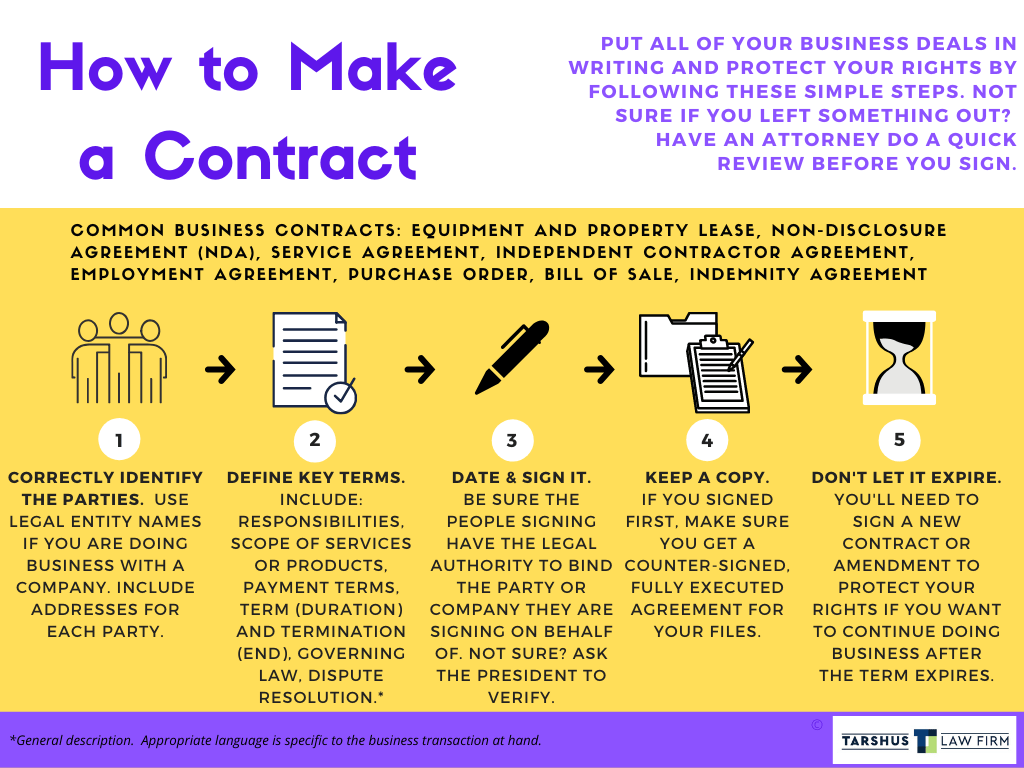Knowing how to write business contracts is essential for any business owner. Before you move forward on an agreement with a business partner, you need to draw up the agreement in writing. A written business contract helps manage the expectations and performance of both parties and can save you from legal and financial issues if a dispute arises in the future.
Here’s everything you need to know about how to write a business contract, including a step-by-step guide, considerations and clauses, and common mistakes to avoid.
When Should Your Business Contract Be in Writing?
When it comes to the question of how to create a business contract, you have two main options: written contracts or verbal agreements. Whenever possible, you should insist on a written agreement, even when it seems unnecessary.
Written contracts hold both parties involved accountable and protect you from ill will or forgetfulness on the part of your business partner. Verbal contracts are also much harder to uphold in court since the terms of the contract become a matter of your word against the other party’s.
Since a verbal agreement isn’t always legally binding, it’s preferable to opt for a written business contract. However, sometimes you don’t have that option. Putting a contract into writing is legally required in many situations. Some of the most common situations that require a written business contract between parties include:
- The transfer or purchase of land;
- Services or actions lasting over one year;
- The sale of goods or services valued over $500;
- The assumption of the debt of another business or individual.
Specifics can be further dictated by your state’s laws. However, in general, it’s safe to assume that contracts regarding any of these points are only legally binding when they’re set down in writing.
Essential Things to Consider Before Making a Business Contract

If you’re a small business owner wondering how to create a contract, recognizing that you need to put your contract into writing is a good first step. However, not every written agreement is equal in the eyes of the law. Even if it’s signed by the other parties, simply having a written document isn’t necessarily the same as having a legally binding agreement.
A business contract needs to meet the six requirements of a contract. A necessary element of how to write a legal business contract involves making sure these essential points have been included.
1. Offer
A solid business contract begins with an offer, which involves one party making the offer of a business arrangement to the other. The purpose of the offer, the intent of the offering party, and the identity of the other party must be specified.
2. Acceptance
Acceptance occurs when the other party communicates an agreement in clear language to accept the offer and move forward. Vague language, implied future acceptance, or acceptance with additional terms or conditions do not count as acceptance of an offer in this context.
3. Consideration
Consideration refers to the concept of each party bringing something to the table. Business contracts exist to benefit both parties, not just one. A legal contract must show that both parties will benefit from the agreement. Consideration is typically indicated by the receipt of money, goods, services, or some benefit that will come in the future.
4. Mutual Consent
Both parties must agree to the terms of the proposed business contract. To meet the legal definition of mutual consent, an agreement must be free of fraud, misrepresentation, and duress. If one party was lied to, misled, coerced, or threatened into a business contract, the law will likely not uphold the agreement.
5. Competence
Competence refers to a person’s ability to knowingly enter into a legal agreement. If one of the parties was underage, under the influence at the time of signing, mentally impaired, or otherwise lacked the mental capacity to enter into a legal agreement, they lack competence in the eyes of the law.
6. Legal Purpose
A contract should exist for a legal purpose. This means that both parties are obligated to meet the terms of the agreement, and the contract’s purpose is to make that agreement legally binding in the event of a dispute or failure to meet the delivery requirements outlined in the contract’s terms.
How to Make a Business Contract: 5 Steps to Follow
Here are the basic steps to make a contract:

Good contracts are well-planned and carefully explain all legal terms in plain language. A contract should never be vague, confusing, or misleading. Following these steps can help small business owners ensure that a business contract isn’t missing essential elements.
1. Include Contact Information for Both Parties
When it comes to the question of how to write up a contract, don’t forget the details. An otherwise well-drafted contract can fail to hold up in court over a minor detail like a misspelled name or the lack of a contact address.
A written contract should begin with the correct legal names of all parties and should also include contact information like business locations and mailing addresses. If you don’t have legal experience, you could easily omit this information, neglect to verify it, or have typos.
The names and contact information of the signing parties are some of the most important details in a business contract. If they’re missing or incorrect, the law can’t do much to uphold the contract’s terms in the event of a dispute.
2. Define Key Terms and the Scope of the Contract
The scope of a contract refers to all of the elements it should encompass, including the obligations that exist between one business and the other business as well as significant dates, times, payments, and other details.
The best way to write a business contract is to never assume or imply — put even the smallest detail down in writing. Legal agreements can’t be too specific, but they can easily be too vague if small details aren’t written into the terms.
- Scope of a Contract: The scope of a contract is the “what” and “how”. The particulars of the contract’s scope rely heavily on the industry, but the scope should generally set forth the purpose of the agreement. It should clearly outline the details of the agreement, including the obligations and responsibilities of both parties. The contract should outline specifics like deadlines and procedures and should consider consequences and responses for situations in which one side fails to meet its contractual responsibilities.
- Timing Specifics: A contract should list the time frames and schedules related to the agreement. For example, if physical products are being created or shipped, timetables for production and shipping should be included as well as the quantity and frequency of shipments and any delivery or acceptance requirements. If services are involved, a contract should clearly outline frequency and duration regarding how often and for how long the services will be rendered.
- Payment Terms: Contracts should include detailed information about payment terms, including how frequently payment will be rendered, the means of making the payments, and any other relevant payment details. Payment and invoicing deadlines should be set in writing, as well as fines, penalties, or other consequences for late or incorrect payments.
- Industry-Specific Considerations: A contract should use concise language to outline any terms and conditions specific to an industry or the type of goods or services being rendered. For example, if products or services are protected by warranties or guarantees, the terms and limitations should be detailed in the business contract.
3. Date and Sign the Contract

A contract is only legally binding if it’s dated and signed by all parties. It’s also essential that you make sure that each signing party possesses the authorization to sign a legally binding contract on behalf of their company.
When a contract exists between two small businesses, it’s often the business owners who sign the contract. However, this isn’t always the case, and a small business might also create contracts with larger companies. Make sure the right person is signing the contract, and when in doubt, verify with the company president.
4. Keep Your Countersigned Copy
Keep on file a countersigned copy of the contract. If you ever need to involve a lawyer, you’ll have to prove that the other party signed the contract in question. Don’t rely on an assumption of good faith — always hold on to evidence that the other party signed the contract.
5. Don’t Let a Contract Expire
Contracts have start and end dates. When a business agreement is going well, it can be easy to forget about the contract’s termination date and continue with business as usual. This is a mistake. If a dispute arises, your business partner is no longer bound to the terms of the contract.
Know when the end of a contract term is drawing near. If you plan to continue with the arrangement, both parties will need to sign an amendment or new contract before the current one expires.
What Clauses Are Typically Included in a Business Contract?
Every business contract should include contact information and scope with terms, conditions, responsibilities, and industry-specific matters. However, it’s common for most contracts to require additional clauses to address specific concerns.
For the most common concerns, general clauses exist that can be added to the main body of a contract. As you go about drafting your contract, you should consider whether any of the following common clauses apply to your business arrangement. If they do, make sure to include them in your contract.
Confidentiality Clause

Maintaining confidentiality is often a central concern as violations can easily give competitors an edge. It’s common for business contracts to contain confidentiality agreements, especially when trade secrets are involved.
A confidentiality clause limits what can be said about internal practices and procedures. Some confidentiality clauses only limit what one side can say, while others are imposed upon both parties. The right one for you depends on what makes sense given the impact a confidentiality violation might have on your business.
Force Majeure Clause
A force majeure clause protects you from fallout due to circumstances beyond your company’s control. Force majeure covers a wide range of scenarios, such as natural disasters, pandemics, and other unforeseen events that make it impossible to meet the conditions of a contract.
Having a force majeure clause in place can protect both parties from being found guilty of violating a contract’s terms.
Severance Clause
Also called a termination clause, a severance clause provides a way out of a contract should an arrangement cease to work for one or both parties. Severance clauses have pros and cons. They serve as contingency plans if a contract doesn’t work out, but they can also make it harder to hold the other party accountable if they want to terminate the contract prematurely.
Choice of Law Clause
A choice of law clause specifies which jurisdiction a contract is subject to. This is especially helpful when a contract involves businesses from multiple states. Setting out the state laws an agreement is bound by helps clear up any confusion and makes arbitration and legal proceedings much easier to navigate.
Dispute Resolution Clause
Business partners don’t usually enter into a contract thinking it will end with legal proceedings, but it happens all the time. It’s smart to include a dispute resolution clause (also called an arbitration clause or a mediation clause), which identifies the method you’ll use to resolve any future disputes.
Damages Clause
A damages clause protects you from financial loss or other harm caused by negligence or malice on the part of your business partner. If the other party fails to deliver on their promises or fails to render payment for goods or services, a damages clause specifies in advance the fines or penalties that will accompany a contract violation.
Common Mistakes When Drafting a Business Contract

Even when a small business owner takes precautions to draft a detailed contract, mistakes still occur. Business lawyers are accustomed to helping business owners who find themselves in difficult situations over business agreements. Knowing some of the most common mistakes lawyers see can help you avoid making them in your contract.
1. The “Wrong Party” Mistake
Make sure the correct legal entity or person is identified as the party you are actually doing business with.
Example #1: You enter into business with a Large Corporation, which has several different legal entities under its umbrella. You want to sell hot dogs, and you contract with “Large Corporation, Inc.” without realizing that you should be contracting with its separate legal entity, “Large Corporation Hotdogs Division, Inc.”, or worse yet, your contract with “Large Corporation Tires Division, Inc”. Make sure you have the right entity identified.
Example #2: John Doe owns a business, My Biz, LLC. The contract identifies John Doe as a party, instead of identifying John Doe in his capacity as Owner and authorized signatory of My Biz, LLC. John Doe is personally responsible for the contract.
2. The “Less Is More” Mistake
While it may be tempting to make your contract as concise as possible, vaguely or poorly defined terms will leave too much ambiguity as to the true intention of the parties. When a disagreement arises, you’ll be back at the negotiation table trying to work out a solution everyone can live with.
Example: In the interest of moving things along without “too much legalese”, Vendor and Supplier sign an agreement that states that Supplier will ship 100 widgets to Vendor each month. The first month, Supplier ships the widgets 10 at a time, causing chaos at Vendor’s warehouse. The next month, Supplier changes its specification for the widgets and starts making widgets that melt, and ships 100 of them to Vendor all at once. Vendor is not prepared to accept widgets that melt and all of the widgets are ruined. Supplier still expects payment, as it followed the terms of the agreement.
3. The “We’ll Always Get Along” Mistake
Not anticipating and specifying what happens when the relationship ends, such as due to breach or termination, can leave you stuck in a bad relationship, or with a big mess to clean up.
Example #1: Vendor and Supplier have been happily doing business for 20 years. Vendor is purchased by Big Company, LLC and the contract is assigned. Big Company, LLC runs a tighter ship and does not allow Supplier to be as flexible. Supplier is miserable and wants to end the contract. However, the contract does not allow for early termination upon notice to the other party, and it automatically renewed last week for another 1-year term. Supplier will have to tough it out for the remainder of the year.
Example #2: Vendor purchased $1MM in TVs from Supplier. Vendor realized it would make more money selling ice cream, so per the terms of its contract, Vendor issued Supplier 30 days’ notice to terminate the contract, and shipped the TVs back to Supplier. Supplier refused to accept the TVs, as there was no post-termination returns clause in the contract and Supplier is under no obligation to take back the TVs. Vendor is stuck with $1MM worth of TVs.
Even once you are confident that your contract is satisfactory, asking a seasoned attorney to perform a quick review before you sign will provide you with excellent insurance against future meltdowns, wasted time, and expense.
Make Your Contract Enforceable with a Lawyer for Business
If you’re a small business owner with limited experience writing contracts, you may find yourself on the internet typing in search terms like “how to make a contract for my small business”.
Even if you feel confident in your ability to research templates and draft contracts for your business, it’s still smart to consult with a business contract lawyer who can spot loopholes and other issues.
Lawyer for Business is a business law firm in New York that helps businesses draft, review, and negotiate contracts. Call (716) 745-6225 to speak with a New York business contract lawyer today.

